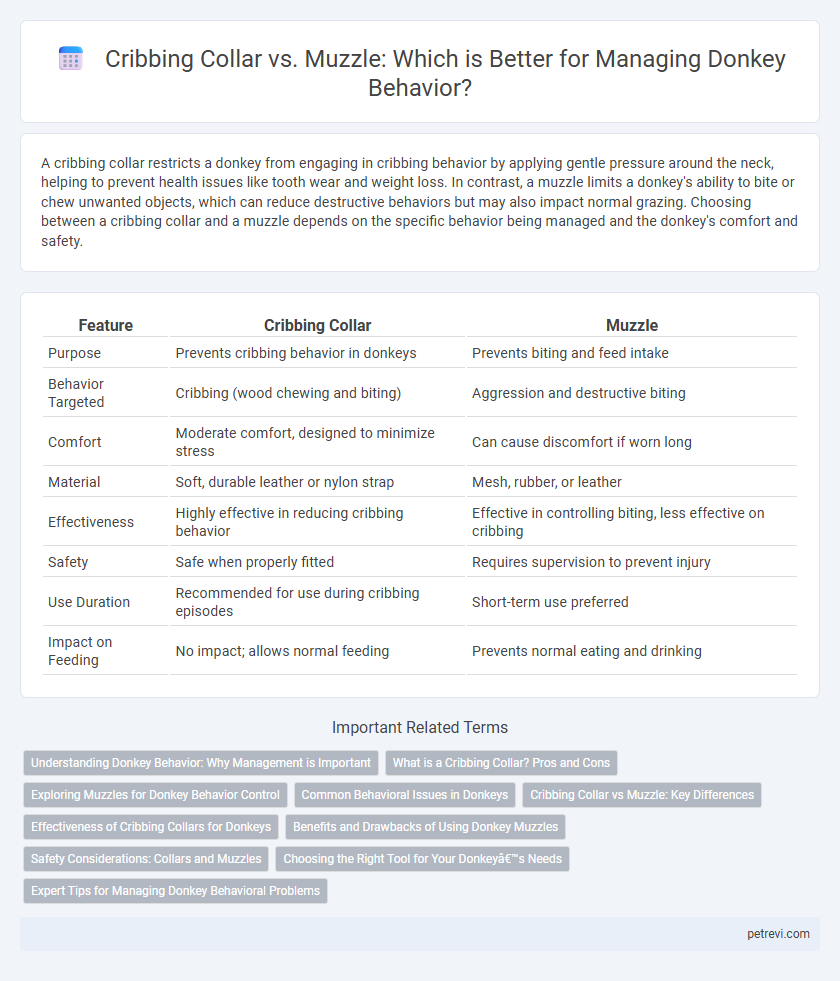A cribbing collar restricts a donkey from engaging in cribbing behavior by applying gentle pressure around the neck, helping to prevent health issues like tooth wear and weight loss. In contrast, a muzzle limits a donkey's ability to bite or chew unwanted objects, which can reduce destructive behaviors but may also impact normal grazing. Choosing between a cribbing collar and a muzzle depends on the specific behavior being managed and the donkey's comfort and safety.
Table of Comparison
| Feature | Cribbing Collar | Muzzle |
|---|---|---|
| Purpose | Prevents cribbing behavior in donkeys | Prevents biting and feed intake |
| Behavior Targeted | Cribbing (wood chewing and biting) | Aggression and destructive biting |
| Comfort | Moderate comfort, designed to minimize stress | Can cause discomfort if worn long |
| Material | Soft, durable leather or nylon strap | Mesh, rubber, or leather |
| Effectiveness | Highly effective in reducing cribbing behavior | Effective in controlling biting, less effective on cribbing |
| Safety | Safe when properly fitted | Requires supervision to prevent injury |
| Use Duration | Recommended for use during cribbing episodes | Short-term use preferred |
| Impact on Feeding | No impact; allows normal feeding | Prevents normal eating and drinking |
Understanding Donkey Behavior: Why Management is Important
Donkeys exhibit natural behaviors such as chewing, biting, and cribbing, which can lead to health problems or damage to their environment if unmanaged. Effective behavior management through tools like cribbing collars or muzzles helps prevent destructive habits while ensuring the donkey's well-being. Understanding the root causes of these behaviors is essential to selecting the appropriate device and promoting positive behavior modification.
What is a Cribbing Collar? Pros and Cons
A cribbing collar is a behavioral management device designed to prevent a donkey from engaging in cribbing, a repetitive oral fixation that can lead to dental damage and digestive issues. Its pros include reducing cribbing behavior and protecting the donkey's health, but cons involve potential discomfort, restricted movement, and the risk of causing stress or injury if improperly fitted. Selecting the right collar requires careful measurement and monitoring to ensure effectiveness without compromising the donkey's welfare.
Exploring Muzzles for Donkey Behavior Control
Exploring muzzles for donkey behavior control reveals a practical solution to prevent cribbing without restricting essential breathing or eating functions. Unlike cribbing collars, muzzles can be custom-fitted to accommodate a donkey's muzzle shape, reducing stress and promoting humane behavior modification. Veterinary studies emphasize the importance of selecting muzzles made from durable, breathable materials that ensure comfort and effectiveness in managing undesirable habits.
Common Behavioral Issues in Donkeys
Cribbing collars and muzzles address common donkey behavioral issues such as cribbing, excessive chewing, and aggressive biting. Cribbing collars are designed to prevent the donkey from gripping and chewing on objects, reducing dental wear and digestive problems, while muzzles restrict biting and overeating but must allow adequate breathing and drinking. Selecting the appropriate device depends on the specific behavior to manage and prioritizes the donkey's comfort and welfare.
Cribbing Collar vs Muzzle: Key Differences
Cribbing collars are specifically designed to prevent donkeys from engaging in cribbing, a repetitive behavior involving biting or sucking on surfaces, which can cause dental and digestive issues. Muzzles, in contrast, serve as broader restraints that restrict the donkey's ability to eat or bite, often used to control feeding or aggressive behavior. While cribbing collars target a particular habit by applying pressure to the throat area, muzzles limit overall mouth function, making them less specialized but more versatile in managing various behavioral challenges.
Effectiveness of Cribbing Collars for Donkeys
Cribbing collars are specifically designed to prevent donkeys from engaging in cribbing behavior by applying gentle pressure around the neck, which discourages the habit without causing harm. Studies indicate that these collars reduce the frequency and intensity of cribbing episodes more effectively than muzzles, which primarily restrict oral access rather than addressing the behavior itself. The effectiveness of cribbing collars in managing repetitive oral behaviors in donkeys makes them a preferred choice for long-term behavior modification.
Benefits and Drawbacks of Using Donkey Muzzles
Donkey muzzles help prevent harmful behaviors such as biting, eating toxic plants, and chewing wood, promoting safety and health. However, muzzles may cause discomfort, restrict natural behaviors like grazing, and require careful fitting to avoid injury or stress. Choosing the right mule type, size, and gradual acclimation are crucial for effective and humane behavior management.
Safety Considerations: Collars and Muzzles
Cribbing collars for donkeys are designed to prevent cribbing behavior by applying gentle pressure around the neck without restricting breathing, ensuring safety during use. Muzzles, while effective in limiting access to grass and objects, must be well-fitted to avoid causing stress, overheating, or breathing difficulties in donkeys. Proper selection and regular monitoring are essential to balance behavior management with the animal's comfort and health.
Choosing the Right Tool for Your Donkey’s Needs
Cribbing collars and muzzles serve different purposes in managing donkey behavior; cribbing collars specifically prevent wood-chewing and self-harm actions, while muzzles limit overall biting and grazing to control diet or aggression. Assessing your donkey's specific habits, such as cribbing tendencies versus general biting or overeating, is crucial for selecting the appropriate device. Proper fit and comfort are essential to ensure effectiveness and prevent stress or injury, making consultation with an equine behavior specialist highly recommended.
Expert Tips for Managing Donkey Behavioral Problems
Cribbing collars and muzzles serve distinct functions in managing donkey behavioral problems, with collars primarily preventing cribbing--a repetitive biting or chewing habit--while muzzles restrict overall mouth access to curb undesirable behaviors such as biting or eating harmful objects. Experts emphasize the importance of proper fitting and gradual introduction of these devices to minimize stress and ensure effectiveness, recommending behavioral modification techniques alongside their use for sustainable results. Regular monitoring and veterinary consultation are crucial to address any health concerns and adjust management strategies tailored to the donkey's specific needs.
Cribbing Collar vs Muzzle for Donkey Behavior Management Infographic

 petrevi.com
petrevi.com